"Is Your Headline Intriguing?"

Here's what it should've said:
Steps to edit intrigue into your headline:
The 5 questions:
Let's apply all of the above to this hypothetical scenario:
- Audience: People suffering from anxiety and struggling to find a treatment without a bucketload of side effects. They've tried medication, meditation, exercise, and counseling.
- Offer: Hydrotherapy treatment for anxiety that is backed by recent research.
- The headline to edit: Stop anxiety with this natural cure
Identify the leaks:
Each question you answered no to identifies a leak. In this scenario, we have the following leaks:
- Emotional: if I believed it, I'd feel hopeful
- Believable: No. I can't differentiate it from quack cures
- Specific: No. What does 'natural' mean?
- Unique: No. Tons of sites make this same claim.
- Continue reading: No. See all of the above.
Fix the leaks:
- Make it believable: Recent research shows hydrotherapy provides immediate relief. Let's add that to the beginning of the headline with: "New science-based solution to... Instantly"
- Get specific: Replace "natural cures" with "without medication, meditation or exercise". Instead of revealing the offer in the headline, I'm eliminating the top 3 solutions they have tried and failed with.
- Be Unique: 1 and 2 have made the headline more unique.
Bring it all together:
1. Does the headline make you feel something? Does it excite you, scare you, give you hope, etc?
2. Is the headline believable? Do you trust the claim made by the headline?
3. Is it specific? Lose 10 pounds is more specific than lose weight. Be specific.
4. Is the promise unique? Is the same promise being made by many others?
5. Do you want to continue reading past the headline? Don't overthink this. What's your gut reaction. This tends to be true when questions 1 through 4 are true.
"Has an intriguing headline" read the copy editing checklist I bought from a guru.
That is NOT an action you take when copy editing. It's the outcome of editing.
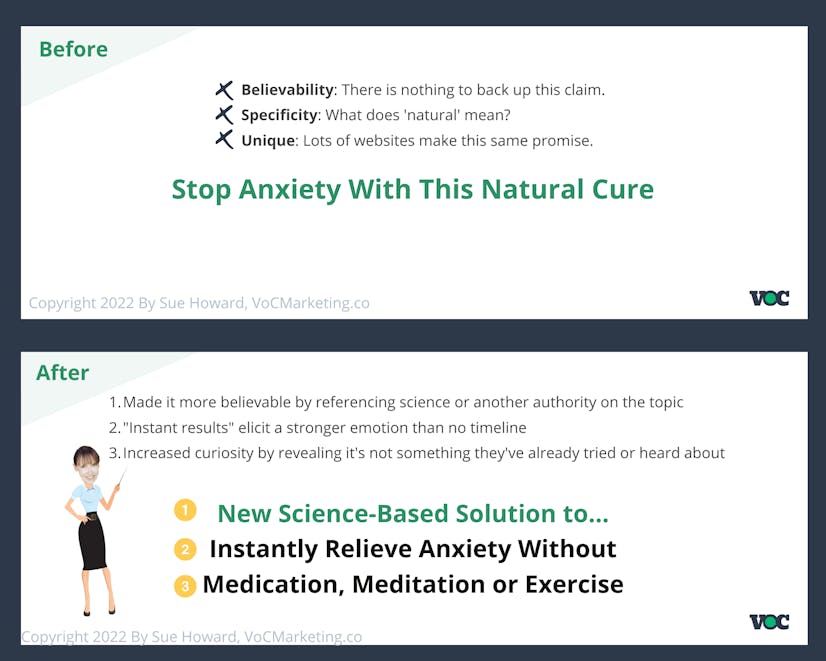
That is how you edit intrigue into a headline.
After writing this all out, I can see why the guru left it at "Has an intriguing headline".

Step 1: Read through the 5 questions below
Step 2: Assume you are a member of their target audience when answering these questions. Do the necessary research to play the part.
Step 3: Answer each question in isolation from the others (this is key to pinpointing leaks!)
Step 4: Fix the first leak (identified by the first question you answered no to)
Step 5: Run through the 5 questions after making a single edit. Sometimes, one edit will fix all of the leaks.

Turn all that high-ticket copywriting knowledge you purchased into profitable action with SparkCopy...

Do you want Sue to edit your copy?

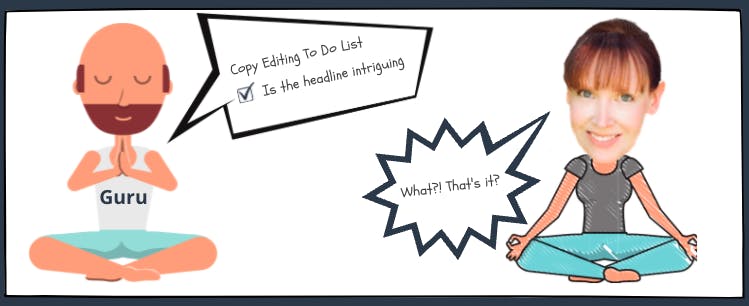
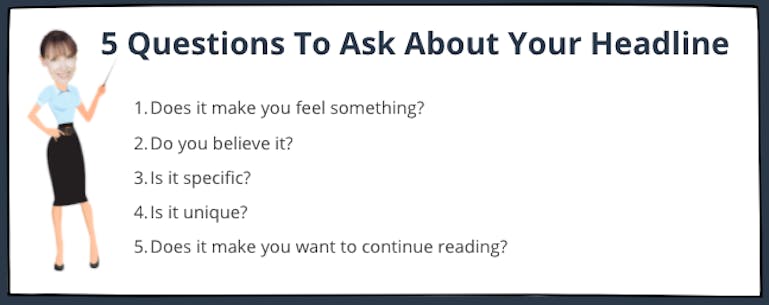
See it in action:
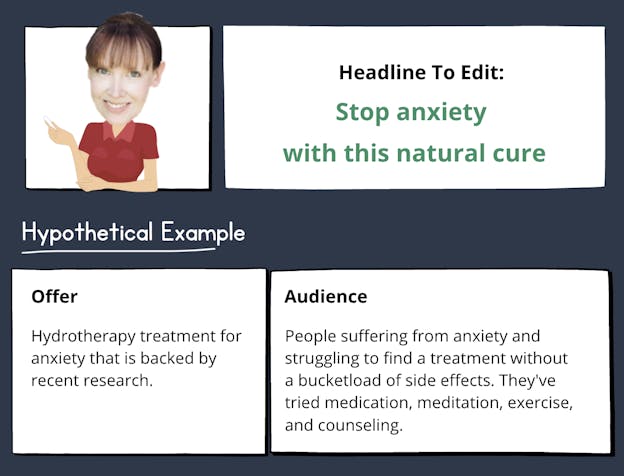
"Has an intriguing headline" read the copy editing checklist I bought from a guru.
That is NOT an action you take when copy editing. It's the outcome of editing.
Sell with humor even if you don't have a funny bone
Age and humor:
Generally speaking, under 35s prefer dark, slapstick, or aggressive humor (e.g., South Park or Dumb and Dumber).
Adults 35+ prefer intelligent, light-hearted humor. Long live Dad jokes.
Self-deprecating humor is my personal favorite.
It's always better to laugh at yourself than at the expense of your readers, but there are risks involved.
How to be funny if you're not naturally funny:
Don't write 'Just kidding' :
If you feel the need to follow it up with "just kidding" then (a) the joke is outside your comfort zone or (b) you don't trust your reader to know it's a joke.
Toss it out regardless of the reason.
A joke that ends with "just kidding", "get it??", or an explanation doesn't work.
You've gotta commit to the joke or let it go.
Sources of inspiration:
- Memes are a good source of dry humor. Images are often used in memes to convey the punchline, but searching for memes on a particular topic can spark your creativity.
- TikTok comments with lots of likes reveal shared experiences you can use in your copy (also an easy way to identify pain points and desired gains).
- Children's TV shows and movies often include dry humor that is over the child's head but entertaining for adults.
Be inspired, don't plagiarize:
If you can recognize and deconstruct humor, you can be funny without being funny.
Following up on a common belief or relatable experience with an unexpected statement is considered funny. The more unexpected the follow up, the funnier it is.
Exhibit A:
"They laughed at me when I said I wanted to become a comedian; well, nobody's laughing now!" - Bob Monkhouse
Comedians call this the setup and the punchline:
- Setup: "They laughed at me when I said I wanted to become a comedian;"
- Punchline: "well, nobody's laughing now!"
The closer the punchline is to the setup, the better.
If you have to devote a few lines of copy to set the scene, the joke shouldn't be in your copy. Every word counts when it comes to making the sale.
Don't waste words setting up a joke.
Humor sells. Sometimes.
When done right, it helps readers get to know, like, and trust us. But it depends on who you're writing for.
Humor works well when writing for a European and North American audience.
Less so in Latin America, Asia, and Africa.
The easiest way to make inspiration your own is to take inspiration from off-topic sources.
The entire joke can be changed by changing one or two words.
For example:
Inspiration: "They laughed when I sat down at the piano;" - L. Wunderman
New: "They laughed at me when I said I wanted to become a comedian;" - B. Monkhouse
Or
Inspiration: "I did lose a little bit of weight recently. But then I found it again. It was in the fridge." - Debra Digiovanni
New: I lost my insecurities. But then I found them again. They were in my ex's bed.
The risk of self-deprecating humor:
Self-deprecating jokes may be interpreted as insecurities if the reader has:
A. Higher status than you (Mentor / Mentee, Guru / Follower, CEO / Executive Assistant)
Or
B. Negative judgments or shame associated with the topic (E.g. fat jokes)
By establishing authority in your copy, you can circumvent status issues. And steer clear of sensitive topics like body image issues to sidestep shame.
With that said, making light of your insecurities isn't necessarily bad. Being able to laugh at yourself may help others find humor in their sources of shame. This could build a stronger bond with your reader.
The problem arises when your reader perceives it as inauthentic. Authenticity builds trust between you and your reader. The perception of inauthenticity can cost you sales.
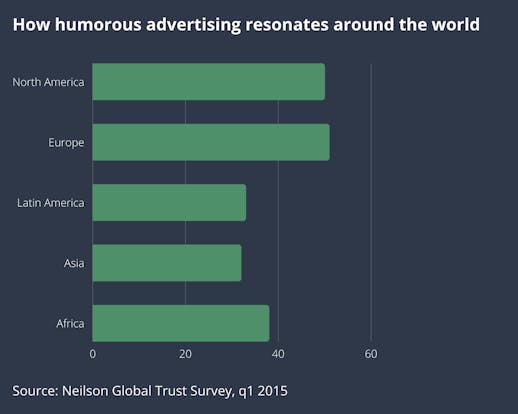

Do you want Sue to edit your copy?